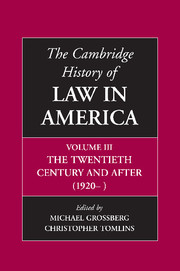Book contents
- Frontmatter
- 1 Law and the State, 1920–2000: Institutional Growth and Structural Change
- 2 Legal Theory And Legal Education, 1920–2000
- 3 The American Legal Profession, 1870–2000
- 4 The Courts, Federalism, and The Federal Constitution, 1920–2000
- 5 The Litigation Revolution
- 6 Criminal Justice in the United States
- 7 Law and Medicine
- 8 The Great Depression and the New Deal
- 9 Labor’s Welfare State: Defining Workers, Constructing Citizens
- 10 Poverty law and income Support: From the Progressive Era to the War on Welfare
- 11 The Rights Revolution in the Twentieth Century
- 12 Race and Rights
- 13 Heterosexuality as a Legal Regime
- 14 Law and the Environment
- 15 Agriculture and the State, 1789–2000
- 16 Law and Economic Change During the Short Twentieth Century
- 17 The Corporate Economy: Ideologies of Regulation and Antitrust, 1920–2000
- 18 Law and Commercial Popular Culture in the Twentieth-Century United States
- 19 Making Law, Making War, Making America
- 20 Law, Lawyers, and Empire
- Bibliographic Essays
- Notes on Contributors
- Index
- References
3 - The American Legal Profession, 1870–2000
Published online by Cambridge University Press: 28 November 2008
- Frontmatter
- 1 Law and the State, 1920–2000: Institutional Growth and Structural Change
- 2 Legal Theory And Legal Education, 1920–2000
- 3 The American Legal Profession, 1870–2000
- 4 The Courts, Federalism, and The Federal Constitution, 1920–2000
- 5 The Litigation Revolution
- 6 Criminal Justice in the United States
- 7 Law and Medicine
- 8 The Great Depression and the New Deal
- 9 Labor’s Welfare State: Defining Workers, Constructing Citizens
- 10 Poverty law and income Support: From the Progressive Era to the War on Welfare
- 11 The Rights Revolution in the Twentieth Century
- 12 Race and Rights
- 13 Heterosexuality as a Legal Regime
- 14 Law and the Environment
- 15 Agriculture and the State, 1789–2000
- 16 Law and Economic Change During the Short Twentieth Century
- 17 The Corporate Economy: Ideologies of Regulation and Antitrust, 1920–2000
- 18 Law and Commercial Popular Culture in the Twentieth-Century United States
- 19 Making Law, Making War, Making America
- 20 Law, Lawyers, and Empire
- Bibliographic Essays
- Notes on Contributors
- Index
- References
Summary
This chapter deals with two broad topics. One is the “legal profession,” the formal institutions and organizations through which associations of lawyers seek and exercise state authority to regulate training for and admission to their guilds, to enforce their rules against members, and to protect their privileges against outsiders. The other and much broader topic is that of lawyers themselves, the people and occupational groups who make up to the profession, their work and social roles and their social standing, economic condition, and political influence. In the United States all lawyers have since the Revolution formally belonged to a single, unified profession, licensed by the states where they practice. There are no official ranks or specialties of lawyers, such as the English distinction between barristers (trial lawyers) and solicitors; the French among avocats, avoués, conseils juridiques, and notaires; or the German between the private profession of advocate and the public professions of civil servant, prosecutor, and judge, each calling for a different training, examination and career path. But in reality the legal profession is many, not one: a collection of occupational groups that work at very diverse practice tasks, enjoy very different levels of status and income, and play very different roles in the economy, politics, and society.
- Type
- Chapter
- Information
- The Cambridge History of Law in America , pp. 73 - 126Publisher: Cambridge University PressPrint publication year: 2008
References
- 9
- Cited by

